

Dave Reingold. Dr.
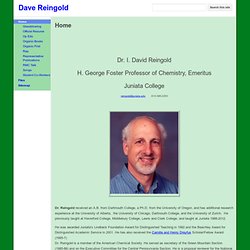
I. David Reingold H. George Foster Professor of Chemistry, Emeritus Juniata College reingold@juniata.edu 814-386-2264 Dr. He was awarded Juniata's Lindback Foundation Award for Distinguished Teaching in 1992 and the Beachley Award for Distinguished Academic Service in 2001. Accepting climate change is the prudent course: Guest opinion. By I.
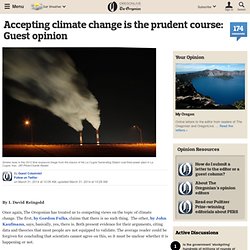
David Reingold Once again, The Oregonian has treated us to competing views on the topic of climate change. The first, by Gordon Fulks, claims that there is no such thing. The other, by John Kaufmann, says, basically, yes, there is. Both present evidence for their arguments, citing data and theories that most people are not equipped to validate. Rather than present more scientific gobbledygook, let me instead take you to the movies. So there you are flying this big airplane, communicating with the ground crew. As luck would have it, there are 100 pilots who happen to be in the control tower at this very moment.
Of course, you know nothing about flying, so you are in no position to make your own judgment on this. What will you do? Obviously, no sane person would substitute his/her own guess for the advice of professional pilots. Climate change really is happening: Guest opinion. By John Kaufmann I would like to challenge Gordon Fulks’ March 16 op-ed claiming that regional temperatures have declined and dismissing global warming.
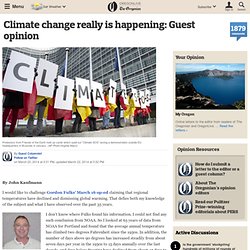
That defies both my knowledge of the subject and what I have observed over the past 35 years. I don’t know where Fulks found his information. I could not find any such conclusion from NOAA. So I looked at 65 years of data from NOAA for Portland and found that the average annual temperature has climbed two degrees Fahrenheit since the 1950s. Even if Fulks did find a location that bucks the trend, it wouldn’t disprove global warming. One must also look at other indicators like ocean temperatures, acidity of oceans, rising sea levels, stratospheric temperature, melting of the Arctic ice cap and the Greenland and Antarctica ice sheets, receding of glaciers, and the proportion of record high temperatures compared to record lows.
Climate Change is Really Happening. Global climate change report: Impacts on Oregon, Pacific Northwest. Reduced snowpacks, less water for irrigation, drought-related wildfires, rising sea levels and insect-infested timber.
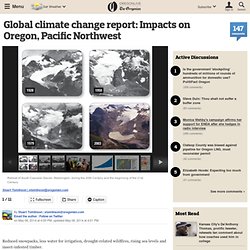
Those are just a few of the impacts of climate disruption that could affect Oregonians, two environmental groups warned Tuesday. The response comes on the heels of the release of the National Climate Assessment and specifically the report's portion addressing climate change impacts on Oregon and the Pacific Northwest. According to the regional report, temperatures are projected to increase 3.3 degrees by 2070 and 9.7 degrees by 2099, "depending largely on total global emissions of heat-trapping gases. " The report was prepared by 300 climate and weather experts and scientists under the guidance of a 60-member federal advisory committee. "We already know global warming threatens our future. The report found that global sea levels have risen about 8 inches since 1880 and are projected to rise 1 to 4 feet by 2100.
--Stuart Tomlinson. Global Climate Change Report. Gardening-for-climate-change. Photo COLUMBIA, S.C. — THIS past winter was a tough one in our backyard.
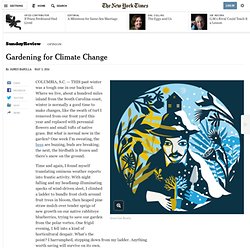
Where we live, about a hundred miles inland from the South Carolina coast, winter is normally a good time to make changes, like the swath of turf I removed from our front yard this year and replaced with perennial flowers and small tufts of native grass. But what is normal now in the garden? One week I’m sweating, the are buzzing, buds are breaking; the next, the birdbath is frozen and there’s snow on the ground.
Time and again, I found myself translating ominous weather reports into frantic activity. How do we garden in a time of ? I’m just beginning to figure out the practical implications of this adaptive approach, but the point seems pretty clear to me: keeping things alive that won’t make it otherwise. An urban garden like my family’s is a good place to start. One study conducted in Davis, Calif., found that 29 of 32 native butterflies in that city breed on nonnative plants. Gardening for Climate Change. Interests, Ideology And Climate.
There are three things we know about man-made global warming.
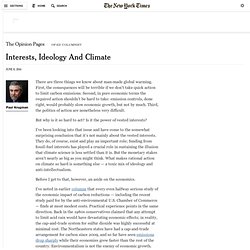
First, the consequences will be terrible if we don’t take quick action to limit carbon emissions. Second, in pure economic terms the required action shouldn’t be hard to take: emission controls, done right, would probably slow economic growth, but not by much. Third, the politics of action are nonetheless very difficult. But why is it so hard to act? Is it the power of vested interests? I’ve been looking into that issue and have come to the somewhat surprising conclusion that it’s not mainly about the vested interests. Before I get to that, however, an aside on the economics. I’ve noted in earlier columns that every even halfway serious study of the economic impact of carbon reductions — including the recent study paid for by the anti-environmental U.S. But wouldn’t protecting the environment nonetheless impose costs on some sectors and regions?
Interests, Ideology And Climate.